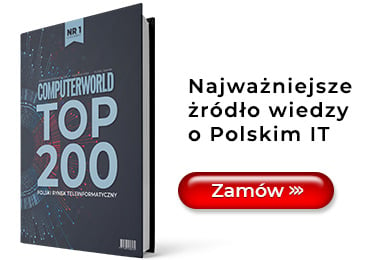We are not coming with empty hands
-

- Przemysław Gamdzyk,
- 19.04.2004
Wacław Iszkowski, Ph.D., President of the Polish Chamber of Information Technology and Telecommunications interviewed by Przemysław Gamdzyk
Wacław Iszkowski, Ph.D., President of the Polish Chamber of Information Technology and Telecommunications interviewed by Przemysław Gamdzyk
We are all thinking about the final results of Poland's accession to the European Union. The referendum showed that the majority of Poles anticipate the balance to be positive. What is the opinion of the Polish IT industry?

Wacław Iszkowski
IT users have been also developing from the early 90s - the banking sector was first, to be followed by the telecommunications, the services sector and the manufacturing industry upon its restructuring. The EU programs that supported IT industry development were also important. They made the government aware of the urgent need to create the basis for the Information Society.
What is our weakness?
Our main problem is the amount of outlays on IT per capita. It is significantly lower than the EU average and so we are no match for the leaders. However, on the other hand, we are not that far behind the least advanced EU members. As compared with other EU Member States, our ICT market is developing more dynamically, which creates good prospects for the future.
It is worth remembering that Poland, as one of the ten accession countries, is bringing in almost 50% of their economic potential and population. Our share in the value of the "new" IT market exceeds one third.
It all means that we have a great development potential. Our economy and our institutions are less saturated with IT solutions than they are in the Western European countries. We simply need appropriate outlays for such investments.
We will surely have to face the problem that is common to all European IT companies, i.e. strong competition from American IT corporations. The EU balance of trade in the IT industry is negative. We have to be aware of the fact that operations of American IT companies will intensify on the Polish market following the accession. We have to tackle this problem together in the European Union. The EU is determined to increase spending on research and development of innovative technologies. There is also a chance for us.
Many people hope that the EU funds will help us develop the Polish IT industry. Experts on the structural funds are employed in many Polish IT companies.
It is a positive phenomenon, of course. However, as in the case of the offset (related to the purchase of American F-16 fighters for the Polish army), one should also consider funds other than those earmarked directly for our sector. The financial resources for IT solutions allocated within all types of funds are much more valuable.
You are talking about opportunities for Poland after the accession to the EU. But what about the threats we will have to face?
After the accession, more foreign companies will enter the Polish market. They will bring along their corporate IT habits, preferences and IT companies that provide services for them. This will mean a greater number of European IT companies on the domestic market. Their expansion will be somehow limited by the need to localize IT applications into Polish. This means, in turn, that local partners, i.e. Polish companies, will be needed. However, I know a lot of people from the EU who are quickly acquiring the Polish language.
As far as the transfer in the other direction is concerned, the situation is slightly worse. Despite a declared openness, the EU market is in fact limiting the expansion possibilities for our businesses. Transition periods to protect local labor markets and requirements to obtain not only European, but also specific local certificates are introduced. For instance, when placing bids in Germany, the company has to present a certificate of a local industry organization to confirm the company's reliability. There are many more such examples, but such obstacles are temporary and will soon be overcome by our businesses.
Thus, I am sure that Polish IT companies will position themselves well in the European economy. What is characteristic for our industry is that when a project is being implemented for a user in a particular location or country, the majority of works can be done on the company's premises or in the native country of the service provider. In this context, Poland is truly competitive due to lower labor costs (sometimes even as much as 50% lower). The benchmark will be set by the upcoming implementation of large and important projects for the EU administration: the creation of a new biometric personal ID system and the European system of health care and social assistance.
Should the existing Member States be afraid of a sudden inflow of Polish IT specialists, which would threaten their labor markets?
I don't think so. The human mobility will obviously rise but it will differ from the past times, when the decision about emigration was irrevocable. You don't have to burn the bridges behind you. The distances in the Europe of today have shrunk. You can work in one country today and in another tomorrow.
Moreover, we are talking about hundreds of top-quality specialists rather than about thousands of workers. Consider what is happening in the world's largest consulting companies: one team may include people from many corners of the world. The origin, the country of birth or residence do not count anymore. What counts is competence and usefulness for a given project. It is highly probable that a similar phenomenon will be more and more visible in IT projects implemented in Europe with the involvement of our IT experts.
We might wait a while for that to happen. Recently a lot has been said about the selection of a company to implement the pilot project for monitoring of the Baltic coastal waters financed by PHARE. After a Polish company had been selected, the results were changed to award the contract to a German company.
I can only hope that such things will not happen when we already are in the EU. It is obvious that one puts one's interest first, especially as one provides the financing. We are aware of the fact that the first years in the EU may be very difficult for our industry. The 'freshman' syndrome is present everywhere - at school, at work, on the football field. The freshman is underprivileged as long as he remains the freshman.
The Polish Chamber of Information Technology and Telecommunications currently associates companies operating in Poland, that create over 50% of the domestic ICT market.

